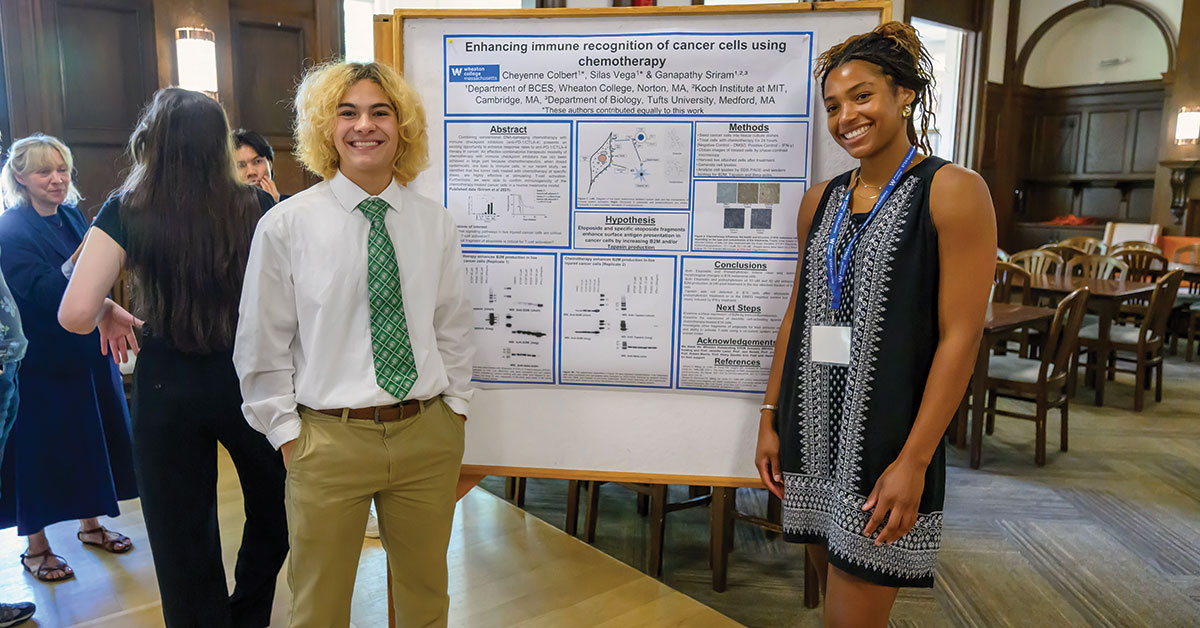Scientific beginnings

Silas Vega ’29 and Cheyenne Colbert ’27 explained the intricacies of the experiments they ran exploring options for boosting the human body’s immune response to fight cancer. Another pair of student researchers shared results on the beneficial impact of personal music choices in reducing physiological stress.
Student research poster sessions were arranged in Emerson Dining, illustrating the range of research projects offered through the Wheaton Outstanding STEM Scholars (WOSS) program, an intensive experiential learning opportunity for incoming first-year STEM students.
The presentations, which featured students who participated in the program during the summer of 2024 and 2025, were part of a daylong symposium celebrating the culmination of the college’s multi-year effort to increase student engagement and enhance outcomes in science with the support of the Howard Hughes Medical Institute (HHMI). Students from Mercy College and the College of the Holy Cross also presented their work. André K. Isaacs, associate professor of chemistry and neuroscience at Holy Cross, delivered a keynote address.
“In my opinion, the student showcase was the highlight of the symposium,” said Juvenal Lopez, assistant professor of biology and coordinator of the WOSS program. “It is humbling to learn about the incredible work that our students do at such an early stage of their academic careers.”
And the program will continue thanks to support from the Wheaton community. The HHMI grant funding has ended, but gifts from the estate and family of Ambassador Samuel R. Gammon III and his wife, Mary ’48, will provide the funding for future summers of scientific exploration by new college students.
Cam Grosser ’28, who conducted research in 2024 with Assistant Professor of Biology Andrew Davinack, earned a co-author credit on research published in the peer-reviewed journal Acta Parasitologica as a result of the program.
“Participating in the program before my first year at Wheaton was super helpful,” said Grosser, an environmental science major. “I started my first year having already done some research and co-authoring a paper as well.”
The program combines a broad introduction to college-level science courses and workshops aimed at developing skills for career readiness along with an intensive research experience with a faculty member. It is specifically designed to reduce the barrier to entry into research experiences in STEM and promote meaningful interactions between incoming students and Wheaton faculty and staff.
“I signed up for the program because I wanted to get lab experience,” said Vega, an Eliza Wheaton Scholar from East Brunswick, N.J. “The lab sessions were really good because a lot of what we did was new to me, but it wasn’t so difficult that I couldn’t get a grasp of it. The first day, Visiting Assistant Professor of Chemistry Ganapathy Sriram had us practicing pipetting for two and a half hours, because we were going to be doing it the whole time we were there. He wanted to make sure we were really good with the basics before we got into the rest of the research.
“For me, it helped me to figure out what I want to do in college,” said Vega, who plans to pursue his interest in biology and chemistry to position himself for a career in cancer research.
In addition to launching the WOSS program, the HHMI grant-funded effort has also resulted in the adoption of new, data-based approaches to teaching STEM topics, supported faculty professional development in inclusive pedagogy, and an ongoing assessment plan to better understand students’ experiences in science education and measure progress toward being fully inclusive.
